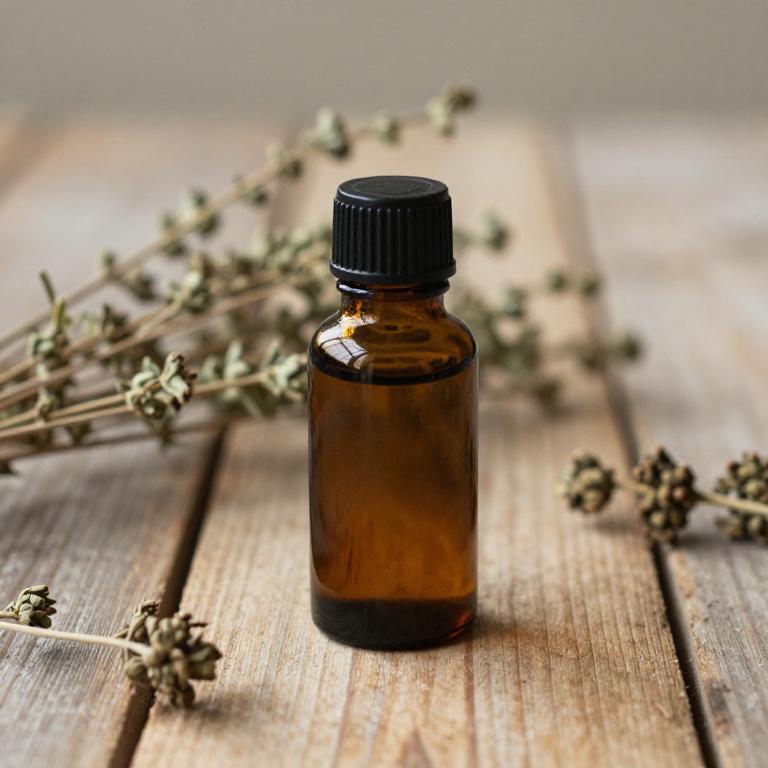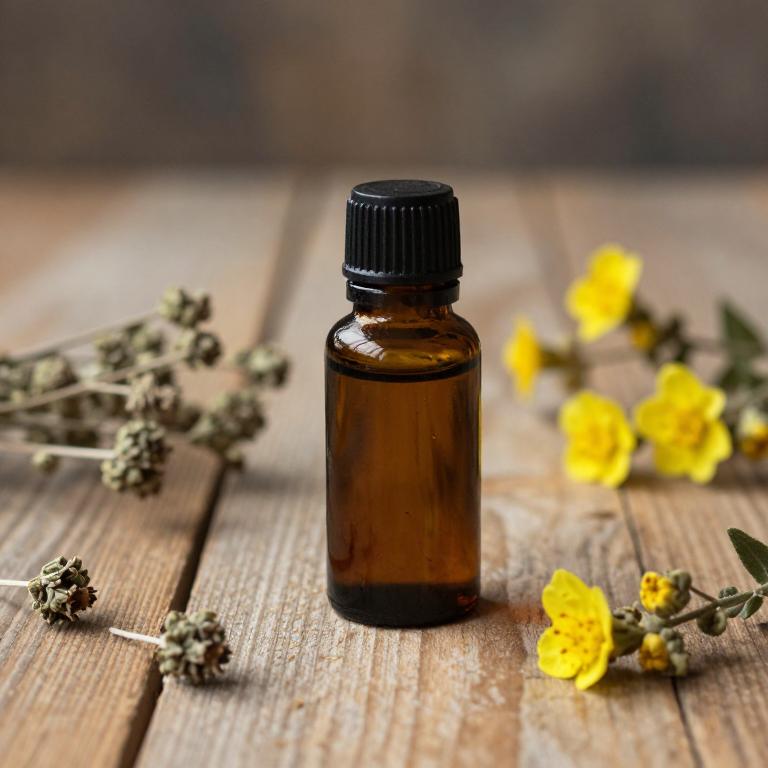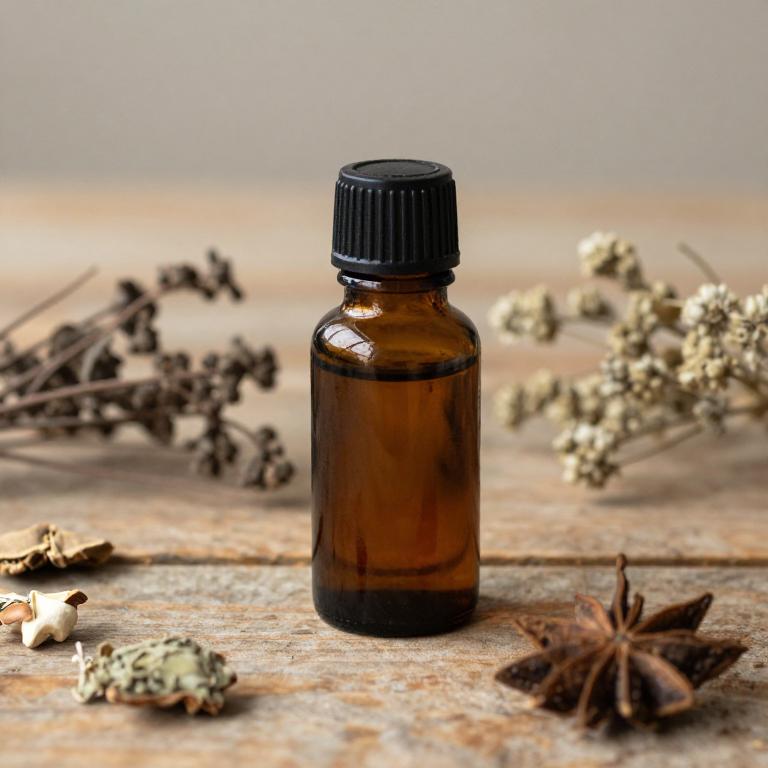10 Best Herbal Essential Oils For Infection

Herbal essential oils have been traditionally used for their antimicrobial properties, making them a natural alternative for combating infections.
Oils such as tea tree, eucalyptus, and lavender contain compounds that can inhibit the growth of bacteria, viruses, and fungi. These oils work by disrupting the cell membranes of pathogens or interfering with their metabolic processes. When properly diluted, they can be applied topically or used in diffusers to support immune function and reduce the risk of infection.
However, it is important to consult a healthcare professional before using essential oils, especially for severe or persistent infections.
Table of Contents
- 1. Thyme (Thymus vulgaris)
- 2. Ceylon cinnamon (Cinnamomum zeylanicum)
- 3. Melaleuca (Melaleuca alternifolia)
- 4. English lavender (Lavandula angustifolia)
- 5. Rosemary (Rosmarinus officinalis)
- 6. Black pepper (Piper nigrum)
- 7. Oregano (Origanum vulgare)
- 8. Eucalyptus (Eucalyptus globulus)
- 9. Common teucrium (Teucrium marum)
- 10. Camphor tree (Cinnamomum camphora)
1. Thyme (Thymus vulgaris)

Thymus vulgaris, commonly known as thyme, is a herb widely used in traditional medicine for its antimicrobial properties.
Its essential oil, extracted through steam distillation, contains potent compounds like thymol and carvacrol, which exhibit strong antibacterial and antifungal effects. These compounds work by disrupting the cell membranes of pathogens, inhibiting their growth and reproduction. Thymus vulgaris essential oil has been studied for its efficacy against various infections, including respiratory tract infections and skin conditions.
Due to its natural antimicrobial activity, it is often used in aromatherapy and as a complementary treatment to support the body's defense mechanisms against infections.
2. Ceylon cinnamon (Cinnamomum zeylanicum)

Cinnamomum zeylanicum, commonly known as cinnamon bark, produces a valuable essential oil that has been traditionally used for its antimicrobial properties.
The oil contains potent compounds such as cinnamaldehyde and eugenol, which exhibit broad-spectrum antimicrobial activity against bacteria, fungi, and certain viruses. Studies have shown that cinnamon essential oil can inhibit the growth of pathogenic microorganisms, making it a promising natural remedy for infections. It is often used in aromatherapy, topical applications, and as a complementary treatment in conventional medicine.
However, due to its potency, it should be diluted and used with caution to avoid skin irritation or allergic reactions.
3. Melaleuca (Melaleuca alternifolia)

Melaleuca alternifolia, commonly known as tea tree oil, is a popular herbal essential oil derived from the leaves of the Melaleuca alternifolia plant, native to Australia.
It is widely recognized for its potent antimicrobial properties, making it effective against various bacteria, fungi, and viruses that can cause infections. Tea tree oil contains active compounds such as terpinen-4-ol, which contribute to its ability to disrupt the cell membranes of microorganisms. Due to its natural antiseptic qualities, it is often used in topical applications to treat skin infections, such as acne, athlete's foot, and minor cuts.
However, it should always be diluted with a carrier oil before use to avoid skin irritation and ensure safe application.
4. English lavender (Lavandula angustifolia)

Lavandula angustifolia, commonly known as English lavender, is widely recognized for its calming properties, but its essential oil also exhibits potent antimicrobial activity, making it a valuable natural remedy for infections.
The essential oil contains compounds such as linalool and lavandin, which have been shown to inhibit the growth of various bacteria and fungi. Studies suggest that lavender oil may be effective against pathogens like Staphylococcus aureus and Candida albicans, supporting its use in treating skin infections and fungal conditions. Due to its broad-spectrum antimicrobial effects, lavender essential oil is often incorporated into topical treatments and aromatherapy for its therapeutic benefits.
However, it is important to use it properly and consult with a healthcare professional, especially for more severe or persistent infections.
5. Rosemary (Rosmarinus officinalis)

Rosmarinus officinalis, commonly known as rosemary, is a medicinal plant whose essential oil has been widely studied for its antimicrobial properties.
The essential oil contains compounds such as camphor, cineole, and pinene, which exhibit broad-spectrum antimicrobial activity against various bacteria and fungi. Research suggests that rosemary essential oil can inhibit the growth of pathogens responsible for respiratory and skin infections. Its ability to disrupt microbial cell membranes makes it a promising natural alternative for treating infections.
When used in aromatherapy or topical applications, rosemary essential oil may support immune function and enhance the body's defenses against infectious agents.
6. Black pepper (Piper nigrum)

Piper nigrum, commonly known as black pepper, contains essential oils that have been traditionally used for their antimicrobial properties.
The essential oils derived from black pepper, particularly those rich in compounds like piperine and other volatile oils, exhibit broad-spectrum antimicrobial activity against various bacteria and fungi. These oils can help in the treatment of infections by inhibiting the growth of pathogenic microorganisms. Due to their potent bioactive components, piper nigrum essential oils are often used in natural remedies and complementary therapies for skin and respiratory infections.
However, their use should be approached with caution, as they may cause irritation if not properly diluted.
7. Oregano (Origanum vulgare)

Origanum vulgare, commonly known as oregano, is a herb widely used in traditional medicine for its potent essential oils, which possess strong antimicrobial properties.
The essential oils extracted from oregano contain compounds such as carvacrol and thymol, which are known for their ability to inhibit the growth of bacteria, fungi, and viruses. These oils have been studied for their potential use in treating various infections, including respiratory and skin infections, due to their antiseptic and anti-inflammatory effects. In recent research, oregano essential oil has shown promise as a natural alternative to conventional antibiotics in combating drug-resistant pathogens.
However, it is important to use these oils cautiously, as they can be potent and may cause irritation if not properly diluted.
8. Eucalyptus (Eucalyptus globulus)

Eucalyptus globulus, commonly known as Australian eucalyptus, is a widely used plant in the production of herbal essential oils due to its potent antimicrobial properties.
The essential oil derived from its leaves contains compounds such as eucalyptol and cineole, which have been shown to exhibit significant antibacterial and antifungal activities. These properties make eucalyptus globulus essential oil a valuable natural remedy for treating various infections, including respiratory tract infections and skin conditions. It is often used in aromatherapy and topical applications to support the body's natural defenses against pathogens.
However, it is important to use this essential oil with caution and dilute it properly to avoid skin irritation or allergic reactions.
9. Common teucrium (Teucrium marum)

Teucrium marum, commonly known as germander, contains essential oils that have been traditionally used for their antimicrobial properties.
The essential oils derived from this plant include compounds such as thymol and carvacrol, which are known for their ability to inhibit the growth of bacteria and fungi. These oils may be particularly effective against infections caused by gram-positive bacteria, making them a valuable natural remedy. When used appropriately, teucrium marum essential oils can support immune function and aid in the treatment of skin infections and respiratory tract infections.
However, due to their potency, they should be diluted and used with caution to avoid skin irritation or toxicity.
10. Camphor tree (Cinnamomum camphora)

Cinnamomum camphora, also known as the Chinese camphor tree, produces essential oils that have been traditionally used for their antimicrobial and anti-inflammatory properties.
These oils contain compounds such as camphor, cineole, and limonene, which exhibit broad-spectrum antimicrobial activity against various bacteria and fungi. Studies suggest that the essential oil of Cinnamomum camphora may help in the treatment of respiratory infections, skin infections, and other microbial conditions due to its ability to inhibit the growth of pathogenic microorganisms. Its soothing and cooling effects also make it useful in alleviating symptoms associated with infections, such as inflammation and discomfort.
However, while promising, further research is needed to fully understand its efficacy and safety in clinical settings.